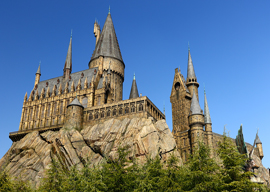
April 19, 2017

Hogwarts School
Source: Bigstock
That’s not necessarily a bad thing. Country clubs tend to be beautiful places for weddings and proms. Moreover, their members tend not to lecture us on how they are on the cutting edge of the war on privilege, although the same can”t be said of the denizens of academia.
Today, American country clubs are usually associated with golf, but the earliest ones, such as The Country Club, which was founded outside Boston in 1882, preceded the golf craze of the end of the 19th century. They were created to provide affluent American commoners with a slightly more affordable version of what English aristocrats enjoyed: a country estate with idyllic Jane Austen-style grounds. The country club’s most important social function was to provide a romantic place to stroll for young persons of suitably matched backgrounds.
Similarly, parents invest huge amounts of money (the list price for four years at Middlebury is $265,328) to allow their scions to enjoy an interlude away from the ever-changing real world.
In the spring of 1914, the eventual global dominance of Anglo-American education did not seem inevitable. Continental universities were highly prestigious then. The oldest was Bologna in Italy, founded in 1088. The most famous might have been the Sorbonne, the University of Paris, in the Latin Quarter. The most academically distinguished were likely German schools such as Gottingen and Heidelberg.
What happened to the great colleges of the Continent?
Defeat.
By 1945, the traditional elites who had built the great universities of Germany, Italy, and France were humiliated. In the postwar leftist reaction, higher education was democratized. Admissions standards were lowered and class sizes inflated.
The famous dueling fraternities of central Europe that had been featured in so many operettas, such as The Student Prince, were seen as anachronisms. Continental higher education became depressingly common, and the rest of the world lost interest in it.
In contrast, the Anglo-Americans won the Big One. So now we have $250 million movies about casting spells at Hogwarts instead of about drinking beer at Heidelberg.
Expensive education is inevitably for the privileged. Although we hear much about the horrors of privilege, liberal young adults seem to love their schools.
One bizarre example among many who hate Donald Trump is their obsession with Harry Potter‘s Hogwarts School. (An Ivy League study found last year that readers of the Harry Potter books tended to dislike Trump more than otherwise similar people who hadn”t read them.)
Blogger Spotted Toad notes:
“Harry Potter” is a funny fantasy for liberals to cohere around. Going off to a centuries-old boarding school where your mum and dad were Head Boy and Head Girl, where tolerance and broadmindedness consists of admitting that lower-class Muggles can occasionally have the same genetically-mediated gifts as the gentry…where ignorance of the supernatural is a form of willful self-delusion, a pathetic blindness to the real forces that move the world, where all the kids eat Merry Olde England foods like Roast Beef and Kidney Pie and Yorkshire Pudding all the time, all sounds more reactionary than progressive.
He goes on to point out:
But if contemporary liberalism is the ideology of imperial academia, funneled through media and non-profits and governmental agencies but responsible ultimately only to itself, the obsession with “Harry Potter” makes a lot more sense.
Today’s youth claim to be democratic, progressive, and egalitarian, but they want their institutions to be more like Hogwarts: paternalistic, protective, and medieval-minded.